Hello dog lovers, today seasonal allergies in German shepherds are my topic. Here I will explain different seasons and their allergies, symptoms of these allergies, and at the end I will explain their treatment in detail.
Seasonal allergies can affect German Shepherds, just as they can affect humans and other animals. These allergies are often obvious in response to environmental factors such as pollen, grass, mold, and other airborne particles that vary throughout the seasons. German Shepherds, known for their intelligence, loyalty, and versatility, can suffer from uncomfortable symptoms like itching, skin irritation, sneezing, and watery eyes due to seasonal allergens.

Hello everyone who loves dogs! I’m Dr. Arif Aziz, and I’ve been taking care of pets especially dogs at my clinic for a long time, exactly 14 years! I’m here to share some valuable information with you that I’ve gathered from books during my study time written by experts in veterinary medicine (DVM) and MSC (Master of Science), as well as from my own experiences working with dogs.
Seasonal Allergies in German Shepherds: Step by Step.
Firstly Understand Different Seasons And Their Common Allergens:
Spring: seasonal allergies in German shepherds
Spring brings about a surge in pollen from trees, flowers, and grasses. German Shepherds may experience heightened allergic reactions during this time as they spend more time outdoors. Pollen counts tend to be highest in the spring, worsening symptoms like itching and respiratory discomfort.
Summer: seasonal allergies in German shepherds:
While summer generally brings warmth and sunshine, it also introduces its own set of allergens. Grass pollen remains prevalent, along with other triggers like mold spores and outdoor allergens. German Shepherds that love outdoor activities may be particularly susceptible to these allergens during the summer months.
Fall: seasonal allergies in German shepherds:
Fall allergies in German Shepherds can be triggered by ragweed, mold spores, and other outdoor allergens. As foliage begins to decay, mold spores become more prevalent, leading to increased allergic reactions. Dogs may also encounter allergens like dust mites as they spend more time indoors during cooler weather.

Winter: seasonal allergies in German shepherds:
While winter typically sees a decrease in outdoor allergens like pollen, German Shepherds can still experience allergic reactions indoors. Dust mites, indoor mold, and pet dander become more problematic as dogs spend more time indoors to avoid the cold weather. Dry indoor air can also exacerbate skin irritation in dogs prone to allergies.
Do German Shepherds have seasonal allergies?
Yes, German Shepherds can really suffer from seasonal allergies. Like many other dog breeds, German Shepherds can be sensitive to environmental allergens such as pollen, grass, mold, and dust mites, which can activate allergic reactions. These allergies may be apparent as itching, skin irritation, redness, inflammation, ear infections, sneezing, watery eyes, and in severe cases, respiratory issues.
The intensity of allergic reactions can vary from dog to dog, and some German Shepherds may be more prone to seasonal allergies than others. Factors such as genetics, immune system health, and environmental exposure can all play a role in determining the severity of allergic reactions in individual dogs.
Owners of German Shepherds should be observant of any signs or symptoms of seasonal allergies in their pets, especially during peak allergy seasons. Consulting with a veterinarian can help identify the specific allergens affecting the dog and develop a suitable treatment plan to manage the symptoms and improve the dog’s quality of life.
How do I know if my dog has seasonal allergies?
Identifying seasonal allergies in your dog requires attention to their behavior and any changes in their physical condition. Here are some signs that your dog may have seasonal allergies:
Excessive Scratching or Licking:
If your dog is constantly scratching, biting, or licking their skin, particularly around the face, paws, ears, or belly, it could be a sign of seasonal allergies. Allergens can irritate your dog’s skin, leading to discomfort and itching.
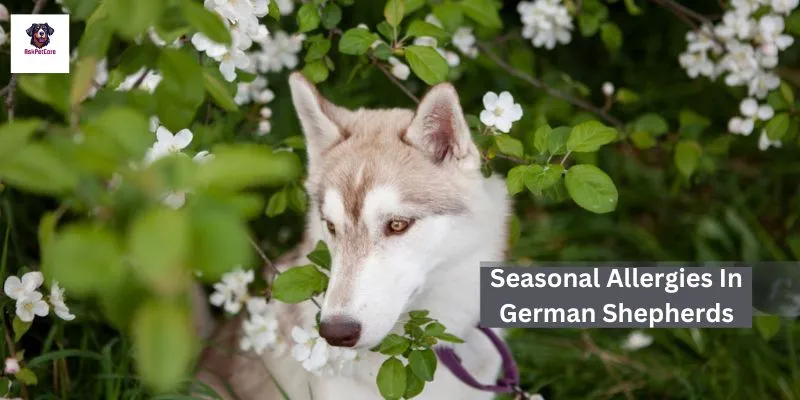
Redness or Inflammation:
Check your dog’s skin for signs of redness, inflammation, or rashes. Allergic reactions can cause the skin to become irritated and inflamed, resulting in hot spots or areas of discomfort.
Chronic Ear Infections:
Dogs with seasonal allergies may develop recurrent ear infections, characterized by redness, swelling, discharge, and a foul odor. Allergens can trigger inflammation in the ear canals, leading to discomfort and infection.
Watery Eyes or Runny Nose:
Similar to humans, dogs with seasonal allergies may experience watery eyes, runny nose, sneezing, and coughing. These respiratory symptoms may worsen during peak allergy seasons when pollen and other allergens are abundant.
Chronic Paw Licking:
Excessive paw licking or chewing can indicate allergies in dogs. Allergens can collect on your dog’s paws during outdoor activities, leading to irritation and discomfort. Persistent licking or chewing of the paws may result in redness, inflammation, and even secondary infections.
Hair Loss or Bald Patches:
Allergic reactions can cause hair loss or bald patches in dogs, particularly in areas where they are scratching or biting excessively. If you notice patches of thinning fur or areas of hair loss on your dog’s skin, it could be related to seasonal allergies.
Change in Behavior:
Dogs with seasonal allergies may exhibit changes in behavior, such as restlessness, irritability, or decreased activity levels. Discomfort caused by itching or skin irritation can affect your dog’s mood and overall well-being.
Chronic Sneezing:
Dogs with seasonal allergies may frequently sneeze, especially after being exposed to outdoor allergens such as pollen or grass. Persistent sneezing can be a sign of respiratory irritation caused by allergens in the environment.
Rubbing Face or Body Against Furniture:
Dogs experiencing discomfort from allergies may rub their face or body against furniture, carpets, or other surfaces in an attempt to alleviate itching or irritation. This behavior, known as “head pressing,” can indicate that your dog is experiencing discomfort due to allergies.
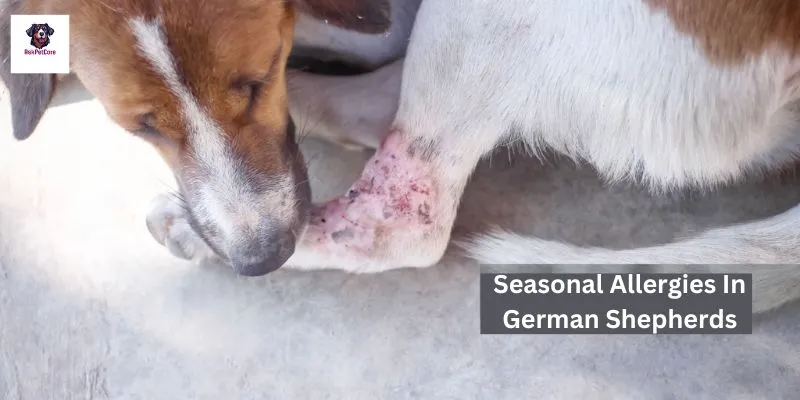
Visible Skin Irritation or Lesions:
Allergic reactions can lead to visible skin irritation, lesions, or scabs on your dog’s skin. These may result from excessive scratching or licking in response to allergens. Inspect your dog’s skin regularly for any signs of irritation or lesions, especially in areas prone to allergies.
Chronic Coughing or Wheezing:
Dogs with seasonal allergies may develop a persistent cough or wheeze, particularly during peak allergy seasons. Allergens such as pollen or mold spores can irritate the respiratory tract, leading to coughing or wheezing in susceptible dogs.
Excessive Shedding:
Allergic reactions can cause stress on your dog’s body, leading to excessive shedding or changes in coat texture. If you notice an increase in shedding or your dog’s coat appears dull or unhealthy, it could be related to allergies or underlying skin irritation.
Red or Irritated Eyes:
Seasonal allergies can cause redness, irritation, or discharge in your dog’s eyes. This may be accompanied by excessive blinking or squinting. If you observe any changes in your dog’s eye appearance or behavior, consult your veterinarian for further evaluation.
Change in Appetite or Weight Loss:
Allergies can affect your dog’s appetite and overall nutritional intake. Dogs experiencing discomfort from allergies may lose interest in food or experience weight loss over time. Monitor your dog’s eating habits and weight closely, and consult your vet if you notice any significant changes.
seasonal allergies in German shepherds

seasonal allergies in German shepherds
Behavioral Changes during Specific Seasons:
Pay attention to any seasonal patterns in your dog’s allergy symptoms. If you notice that your dog’s symptoms worsen or improve during specific times of the year, it may indicate seasonal allergies triggered by environmental factors like pollen, grass, or mold.
If you suspect that your dog has seasonal allergies, it’s important to seek veterinary advice for proper diagnosis and treatment. Your vet can recommend allergy testing, prescribe medications, and provide guidance on managing your dog’s allergies to improve their comfort and quality of life.
Now I explain in a table with all 15 signs of seasonal allergies in dogs:
| Sign | Description |
| Excessive scratching | Your dog may scratch excessively, often leading to irritated skin or hot spots. |
| Red or watery eyes | Allergies can cause redness, discharge, or watery eyes in dogs, similar to humans. |
| Runny nose | Dogs with allergies may have a runny nose or sneeze frequently due to allergens. |
| Chronic ear infections | Allergic reactions can lead to recurrent ear infections, characterized by redness and discharge. |
| Paw licking | Excessive licking or chewing of paws can indicate allergies, leading to skin irritation. |
| Hair loss or bald patches | Allergies may cause hair loss or bald patches, particularly in areas of intense itching. |
| Chronic coughing or wheezing | Dogs may cough or wheeze due to respiratory irritation caused by allergens. |
| Change in behavior | Allergies can lead to changes in behavior, such as restlessness or irritability. |
| Rubbing face against surfaces | Dogs may rub their face against furniture or carpets to alleviate itching caused by allergies. |
| Chronic sneezing | Persistent sneezing can be a sign of respiratory irritation from exposure to allergens. |
| Visible skin irritation | Allergic reactions can cause visible redness, inflammation, or lesions on your dog’s skin. |
| Excessive shedding | Dogs experiencing allergies may shed excessively or have changes in coat texture. |
| Red or irritated eyes | Allergies can lead to redness, irritation, or discharge in your dog’s eyes. |
| Change in appetite or weight | Allergies can affect your dog’s appetite, leading to changes in weight or eating habits. |
| Behavioral changes by season | Allergy symptoms may worsen or improve seasonally, indicating sensitivity to environmental changes. |
Understanding these signs can help pet owners recognize potential allergies in their dogs and seek suitable veterinary care for diagnosis and treatment.
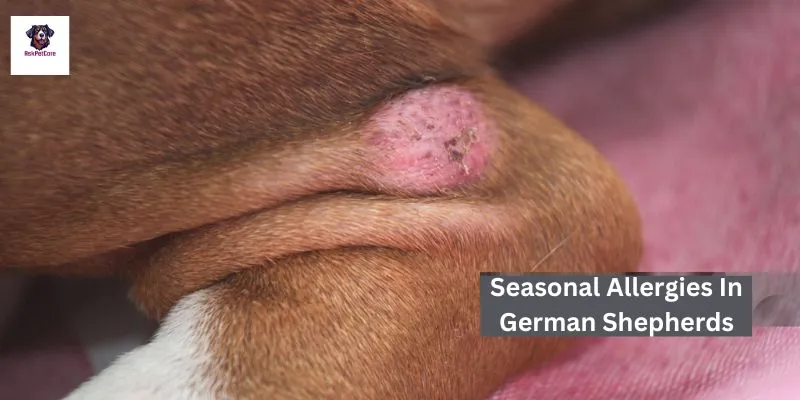
How do I know if I’m allergic to my German Shepherd?
Now I explain here 15 signs that you may be allergic to your German shepherd:
Respiratory Symptoms:
Persistent sneezing, coughing, wheezing, or shortness of breath after exposure to your German shepherd.
Itchy or Watery Eyes:
Red, itchy, or watery eyes that occur when in close proximity to your dog.
Skin Reactions:
Itchy skin, hives, or rashes after touching or petting your German Shepherd.
Nasal Congestion:
Difficulty breathing through your nose, especially when around your dog.
Runny Nose:
Experiencing a runny or stuffy nose in the presence of your German shepherd.
Sore Throat:
Irritation or discomfort in your throat after spending time with your dog.
Coughing or Wheezing:
Persistent coughing or wheezing that worsens when near your German Shepherd.
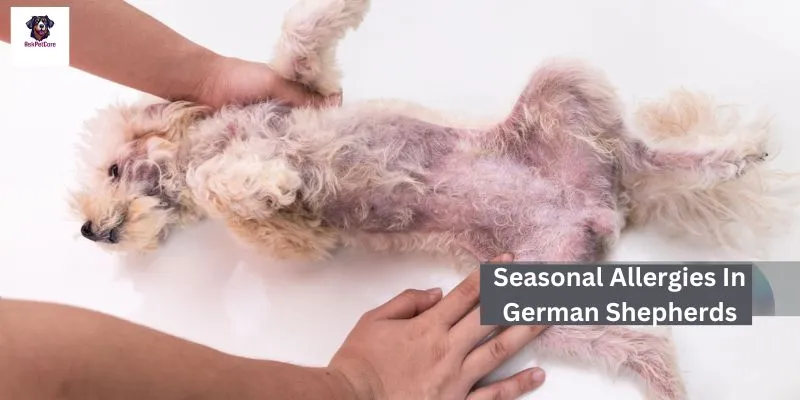
Fatigue:
Feeling tired or lethargic after being around your dog.
Facial Pressure:
Feeling pressure or heaviness in your face, particularly around the nose and eyes.
Skin Irritation:
Redness, itching, or swelling of the skin after contact with your German Shepherd.
Ear Congestion:
The feeling of fullness or pressure in the ears when near your dog.
Sneezing Fits:
Frequent and uncontrollable bouts of sneezing triggered by exposure to your German Shepherd.
Difficulty Sleeping:
Allergy symptoms may disrupt your sleep, causing insomnia or restless nights.
Asthma Attacks:
Individuals with asthma may experience exacerbations or attacks triggered by pet allergens.
General Discomfort:
The overall feeling of discomfort or wellness when in the presence of your German Shepherd.
If you experience several of these symptoms consistently when interacting with your German shepherd, it’s advisable to consult with an allergist for proper testing and diagnosis. They can help determine whether you are allergic to your dog and recommend appropriate management strategies to reduce your exposure to allergens and alleviate symptoms.
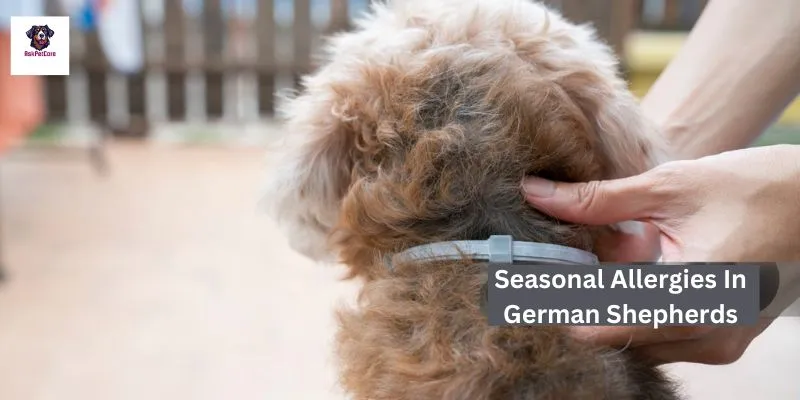
Seasonal allergies in German shepherds symptoms:
Now I explain 15 symptoms of seasonal allergies in German Shepherds:
Excessive Scratching: German Shepherds with seasonal allergies may scratch excessively, particularly in areas like the face, ears, belly, and paws.
Chronic Licking or Chewing: Dogs may excessively lick or chew at their skin or paws in response to irritation caused by seasonal allergens.
Skin Irritation: Allergic reactions can lead to redness, inflammation, or rash-like patches on the skin of German Shepherds.
Hot Spots: Areas of the skin that are particularly irritated may become hot spots, which are painful, inflamed patches of skin that can worsen with scratching.
Hair Loss: Seasonal allergies can cause German Shepherds to lose hair, resulting in patchy or thinning coats in affected areas.
Ear Infections: Dogs with seasonal allergies may be more prone to ear infections, characterized by redness, odor, discharge, and itching in the ears.
Watery Eyes: German Shepherds may experience watery or teary eyes as a result of seasonal allergies.
Runny Nose: Allergic reactions can cause dogs to have a runny or congested nose, accompanied by sneezing and sniffling.
Sneezing: Dogs may sneeze frequently in response to airborne allergens such as pollen, dust, or mold.
Coughing: Some dogs with seasonal allergies may develop a dry, persistent cough due to irritation in the respiratory tract.
Wheezing: Wheezing or labored breathing can occur in severe cases of seasonal allergies, particularly in dogs with pre-existing respiratory conditions.
Red or Inflamed Gums: Allergic reactions can also affect the gums, leading to redness, inflammation, or irritation.
Vomiting or Diarrhea: In some cases, dogs with allergies may experience gastrointestinal symptoms such as vomiting or diarrhea, especially if they ingest allergens through licking or grooming.
Lethargy: Allergic reactions can cause dogs to feel lethargic or tired due to the discomfort and inflammation associated with allergies.
Behavioral Changes: Dogs may exhibit changes in behavior, such as irritability, restlessness, or decreased activity levels when experiencing discomfort from seasonal allergies.
If you notice any of these symptoms in your German shepherd, especially during specific seasons or when exposed to certain environmental triggers, it’s important to consult with your veterinarian for proper diagnosis and treatment of seasonal allergies.
Seasonal allergies in German shepherds treatment:
Now I explain 15 treatments for seasonal allergies in German Shepherds:
Antihistamines:
Veterinarians may prescribe antihistamines to help reduce itching, sneezing, and other allergy symptoms in German Shepherds.
Corticosteroids:
In severe cases, corticosteroids may be prescribed to reduce inflammation and alleviate allergic reactions in German Shepherds.
Immunotherapy (Allergy Shots):
Immunotherapy involves administering gradually increasing doses of allergens to desensitize the immune system and reduce allergic reactions over time.

Fatty Acid Supplements:
Omega-3 and omega-6 fatty acid supplements can help support skin health and reduce inflammation associated with seasonal allergies in German Shepherds.
Topical Treatments:
Topical treatments such as medicated shampoos, sprays, and creams can help soothe irritated skin and reduce itching in German Shepherds.
Allergy Testing:
Allergy testing can help identify specific allergens that trigger allergic reactions in German Shepherds, allowing for targeted treatment and allergen avoidance strategies.
Dietary Modifications:
Switching to a hypoallergenic or limited ingredient diet can help reduce allergic reactions in German Shepherds sensitive to certain food allergens.
Environmental Control:
Minimize your German shepherd’s exposure to outdoor allergens by keeping them indoors during peak pollen seasons and wiping their paws after outdoor activities.
Air Purifiers:
Use high-efficiency particulate air (HEPA) filters in your home to remove airborne allergens and improve indoor air quality for your German Shepherd.
Regular Bathing:
Bathe your German shepherd regularly with a hypoallergenic shampoo to remove allergens from their coat and soothe irritated skin.
Flea Control:
Flea infestations can exacerbate allergic reactions in German Shepherds, so regular flea control measures should be implemented to prevent flea bites and allergic dermatitis.
Moisturizers:
Apply moisturizing creams or lotions to your German shepherd’s skin to help prevent dryness and reduce itching associated with seasonal allergies.
Environmental Changes:
Reduce indoor humidity levels and keep your home clean and free of dust, mold, and other indoor allergens that can trigger allergic reactions in German Shepherds.
Supplements:
Provide supplements such as quercetin, bromelain, and probiotics to help support your German Shepherd’s immune system and reduce allergic reactions.
Consultation with a Veterinary Dermatologist:
In severe cases, consult with a veterinary dermatologist may be necessary to develop a comprehensive treatment plan tailored to your German shepherd’s specific needs.
I hope you will thoroughly understand seasonal allergies in German shepherds, still any queries contact me.
Always consult with your veterinarian before starting any treatment regimen for your German Shepherd’s seasonal allergies to ensure safety and efficacy.
- Q: Can German Shepherds have seasonal allergies?
Yes, German Shepherds can develop seasonal allergies, often triggered by pollen, grass, mold, and other environmental factors.
- Q: What are common signs of seasonal allergies in German Shepherds?
Common signs include itching, scratching, redness, ear infections, watery eyes, and sneezing, especially during certain seasons.
- Q: How do I treat seasonal allergies in my German Shepherd?
Treatment may include antihistamines, corticosteroids, immunotherapy, regular grooming, dietary modifications, and environmental control measures.
- Q: Are there over-the-counter remedies for German Shepherds with seasonal allergies?
Some antihistamines and supplements may be available over the counter, but it’s best to consult a veterinarian for proper diagnosis and treatment.
- Q: Can seasonal allergies in German Shepherds be prevented?
While seasonal allergies cannot always be prevented, minimizing exposure to allergens, maintaining good hygiene, and seeking veterinary care can help manage symptoms effectively.
Here are some reference books that are considered authoritative on the topic:
These books cover a range of topics related to dermatology and skin diseases in dogs, including diagnosis, treatment, and management of skin conditions.
- “Muller and Kirk’s Small Animal Dermatology” by William H. Miller Jr. DVM DACVD, Craig E. Griffin DVM DACVD, Karen L. Campbell DVM DACVD :
- “Skin Diseases of the Dog and Cat” by Nicole A. Heinrich DVM DACVD, Melissa Eisenschenk DVM DACVD – :
- “Canine and Feline Dermatology Drug Handbook” by Sandra N. Koch DVM MS DACVD, Cheryl S. Hedlund DVM MS DACVD :
Disclaimer: This information is general advice only. Before starting any treatment or supplement with your pet, please consult your vet first for the best approach to getting your pet back to its best health.
Check with your veterinarian before giving any medication or supplement at home, to be sure it’s safe for your pup. Some substances can be toxic or harmful, including “dog-safe” medications and supplements if they are given at the wrong dosage.
